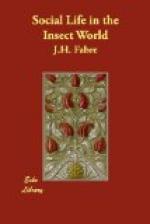They have been warned by the sense of smell, although far away in all directions, while I myself can escape from the stench by recoiling a few paces. In comparison with their sense of smell mine is miserable; but in this case, both for me and for them, there is really what our language calls an odour.
I can do still better with the flower of the Serpent Arum (Arum dracunculus), so noteworthy both for its form and its incomparable stench. Imagine a wide lanceolated blade of a vinous purple, some twenty inches in length, which is twisted at the base into an ovoid purse about the size of a hen’s egg. Through the opening of this capsule rises the central column, a long club of a livid green, surrounded at the base by two rings, one of ovaries and the other of stamens. Such, briefly, is the flower or rather the inflorescence of the Serpent Arum.
For two days it exhales a horrible stench of putrid flesh; a dead dog could not produce such a terrible odour. Set free by the sun and the wind, it is odious, intolerable. Let us brave the infected atmosphere and approach; we shall witness a curious spectacle.
Warned by the stench, which travels far and wide, a host of insects are flying hither; such insects as dissect the corpses of frogs, adders, lizards, hedgehogs, moles and field-mice—creatures that the peasant finds beneath his spade and throws disembowelled on the path. They fall upon the great leaf, whose livid purple gives it the appearance of a strip of putrid flesh; they dance with impatience, intoxicated by the corpse-like odour which to them is so delicious; they roll down its steep face and are engulfed in the capsule. After a few hours of hot sunlight the receptacle is full.
Let us look into the capsule through the narrow opening. Nowhere else could you see such a mob of insects. It is a delirious mixture of backs and bellies, wing-covers and legs, which swarms and rolls upon itself, rising and falling, seething and boiling, shaken by continual convulsions, clicking and squeaking with a sound of entangled articulations. It is a bacchanal, a general access of delirium tremens.
A few, but only a few, emerge from the mass. By the central mast or the walls of the purse they climb to the opening. Do they wish to take flight and escape? By no means. On the threshold of the cavity, while already almost at liberty, they allow themselves to fall into the whirlpool, retaken by their madness. The lure is irresistible. None will break free from the swarm until the evening, or perhaps the next day, when the heady fumes will have evaporated. Then the units of the swarm disengage themselves from their mutual embraces, and slowly, as though regretfully, take flight and depart. At the bottom of this devil’s purse remains a heap of the dead and dying, of severed limbs and wing-covers torn off; the inevitable sequels of the frantic orgy. Soon the woodlice, earwigs, and ants will appear to prey upon the injured.




